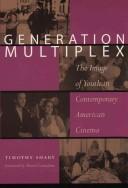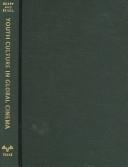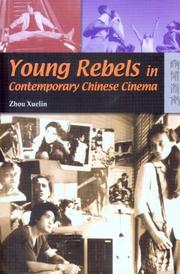| Listing 1 - 10 of 19 | << page >> |
Sort by
|
Book
Year: 1965 Publisher: Tilburg : Uitgeverij Zwijsen,
Abstract | Keywords | Export | Availability | Bookmark
 Loading...
Loading...Choose an application
- Reference Manager
- EndNote
- RefWorks (Direct export to RefWorks)
Book
ISBN: 0292760701 Year: 2014 Publisher: Austin : University of Texas Press,
Abstract | Keywords | Export | Availability | Bookmark
 Loading...
Loading...Choose an application
- Reference Manager
- EndNote
- RefWorks (Direct export to RefWorks)
Generation Multiplex (2002) was the first comprehensive study of the representation of teenagers in American cinema since David Considine’s Cinema of Adolescence in 1985. This updated and expanded edition reaffirms the idea that films about youth constitute a legitimate genre worthy of study on its own terms. Identifying four distinct subgenres—school, delinquency, horror, and romance—Timothy Shary explores hundreds of representative films while offering in-depth discussion of movies that constitute key moments in the genre, including Fast Times at Ridgemont High, A Nightmare on Elm Street, The Breakfast Club, Say Anything . . . , Boyz N the Hood, Scream, American Pie, Napoleon Dynamite, Superbad, The Twilight Saga, and The Hunger Games. Analyzing developments in teen films since 2002, Shary covers such topics as the increasing availability of movies on demand, which has given teens greater access to both popular and lesser-seen films; the recent dominance of supernatural and fantasy films as a category within the genre; and how the ongoing commodification of teen images in media affects real-life issues such as school bullying, athletic development, sexual identity, and teenage pregnancy.
Book
ISBN: 9783319893808 Year: 2018 Publisher: Cham : Palgrave Macmillan,
Abstract | Keywords | Export | Availability | Bookmark
 Loading...
Loading...Choose an application
- Reference Manager
- EndNote
- RefWorks (Direct export to RefWorks)
This volume explores the recent `adolescent turn' in contemporary Latin American cinema, challenging many of the underlying assumptions about the nature of youth and distinguishing adolescence as a distinct and vital area of study. Its contributors examine the narrative and political potential of teenage protagonists in a range of recent films from the region, acknowledging the distinct emotional registers that are at play throughout adolescence and releasing teenage subjectivities from restrictive critical and theoretical emphases on theories of childhood. As the first academic study to examine the figure of the adolescent in contemporary Latin American film, New Visions of Adolescence in Contemporary Latin American Cinema thus presents a timely and innovative analysis of issues of sexuality and gender, political and domestic violence and social class, and will be of significant interest to students and researchers in Latin American Studies, Cultural Studies, World Cinema and Childhood Studies.
Book
ISBN: 9781138681224 Year: 2018 Publisher: London : Routledge,
Abstract | Keywords | Export | Availability | Bookmark
 Loading...
Loading...Choose an application
- Reference Manager
- EndNote
- RefWorks (Direct export to RefWorks)
"Part romantic comedy, part sitcom, part social drama, L'Auberge espagnole (The Spanish Apartment) recounts a familiar 'youth' ritual - the move from university to 'the real world', the often complicated personal, romantic and cultural encounters that ensue, and the moral uncertainties that characterize that key biological and physiological developmental stage between adolescence and adulthood. French director Cédric Klapisch showcases the extraordinary colour and beauty of Barcelona's architecture, and places his hero Xavier at the heart of this smartly written film that makes a series of wry observations on educational exchange programmes, multi-culturalism, and the direction European youth might take in the twenty-first century. This book addresses the topic of Europe's youth generation, paying particular attention to the ways in which the film's depicts the transition from adolescence to adulthood as allegory for the experiences of European society as it moves through periods of readjustment towards uncertain futures. It also looks into the ecosystem of contemporary French cinema, the Erasmus programme and its influence on youth experience, and identity politics in relation to 'nationhood' and 'European-ness'. The book also examines the two sequels to the film - Russian Dolls (2005) and Chinese Puzzle (2013) - and how the complications faced by the main characters across the trilogy suggest that the move to adulthood is a never-ending process of growing up and reaching a level of self-actualization"--

ISBN: 0292777523 029277771X Year: 2002 Publisher: Austin, Tex. University of Texas Press
Abstract | Keywords | Export | Availability | Bookmark
 Loading...
Loading...Choose an application
- Reference Manager
- EndNote
- RefWorks (Direct export to RefWorks)
Age group sociology --- Film --- United States --- Youth in motion pictures. --- Motion pictures --- Jeugd in de film --- Jeunesse dans le cinéma --- Youth in motion pictures --- United States of America

ISBN: 9780292709300 9780292714144 0292714149 0292709307 Year: 2007 Publisher: Austin : University of Texas Press,
Abstract | Keywords | Export | Availability | Bookmark
 Loading...
Loading...Choose an application
- Reference Manager
- EndNote
- RefWorks (Direct export to RefWorks)
Coming of age is a pivotal experience for everyone. So it is no surprise that filmmakers around the globe explore the experiences of growing up in their work. From blockbuster U.S. movies such as the Harry Potter series to thought-provoking foreign films such as Bend It Like Beckham and Whale Rider, films about youth delve into young people's attitudes, styles, sexuality, race, families, cultures, class, psychology, and ideas. These cinematic representations of youth also reflect perceptions about youth in their respective cultures, as well as young people's worth to the larger society. Indeed, as the contributors to this volume make plain, films about young people open a very revealing window on the attitudes and values of cultures across the globe. Youth Culture in Global Cinema offers the first comprehensive investigation of how young people are portrayed in film around the world. Eighteen established film scholars from eleven different national backgrounds discuss a wide range of films that illuminate the varied conditions in which youth live. The essays are grouped thematically around the issues of youthful resistance and rebellion; cultural and national identity, including religion and politics; and sexual maturation, including gender distinctions and coming-of-age queer. Some essays engage in close readings of films, while others examine the advertising and reception of films or investigate psychological issues. The volume concludes with filmographies of over 700 youth-related titles arranged by nation and theme.
Youth in motion pictures. --- Jeunesse au cinéma --- Jeunesse au cinéma
Book
ISBN: 9780367788070 Year: 2021 Publisher: London : Routledge,
Abstract | Keywords | Export | Availability | Bookmark
 Loading...
Loading...Choose an application
- Reference Manager
- EndNote
- RefWorks (Direct export to RefWorks)
Book
ISBN: 9789873754111 Year: 2016 Publisher: Buenos Aires : Libraria,
Abstract | Keywords | Export | Availability | Bookmark
 Loading...
Loading...Choose an application
- Reference Manager
- EndNote
- RefWorks (Direct export to RefWorks)
Families in motion pictures. --- Motion pictures --- Youth in motion pictures. --- History

ISBN: 9789622098497 Year: 2007 Publisher: Hong Kong Hong Kong university press
Abstract | Keywords | Export | Availability | Bookmark
 Loading...
Loading...Choose an application
- Reference Manager
- EndNote
- RefWorks (Direct export to RefWorks)
Motion pictures --- Politics in motion pictures --- Youth in motion pictures --- History

ISBN: 9882207707 1283016931 9786613016935 9882206077 9789882206076 9789622098497 9622098495 Year: 2007 Publisher: Hong Kong Hong Kong University Press
Abstract | Keywords | Export | Availability | Bookmark
 Loading...
Loading...Choose an application
- Reference Manager
- EndNote
- RefWorks (Direct export to RefWorks)
Has China in the 1980s gone through a phase of ""youth rebellion"" comparable with that represented in films such as Rebel Without a Cause (1954), Look Back in Anger (1959) or Easy Rider (1969)? The present study is an attempt to look for evidence in the ""youth-rebellion"" films produced over that period of time that may help to answer the question.
Youth in motion pictures. --- Politics in motion pictures. --- Motion pictures --- History.
| Listing 1 - 10 of 19 | << page >> |
Sort by
|

 Search
Search Feedback
Feedback About UniCat
About UniCat  Help
Help News
News